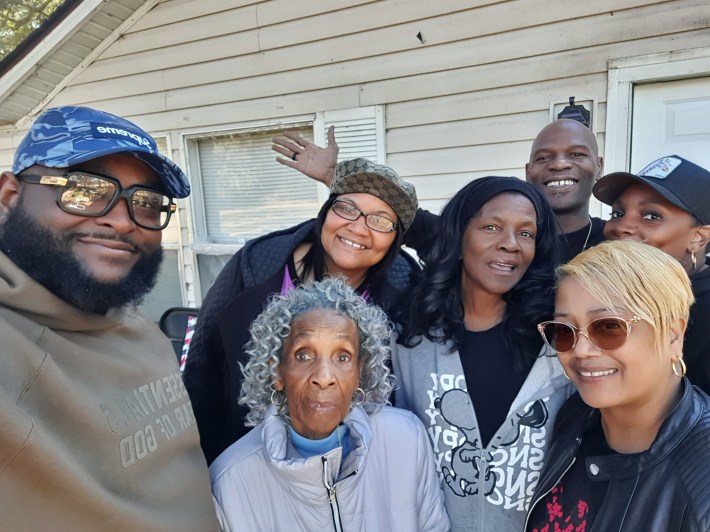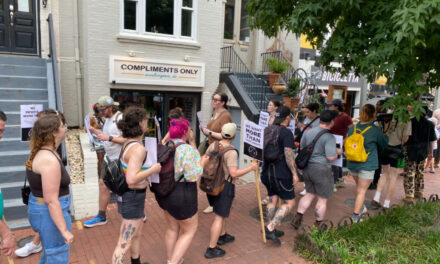For over 30 years, Josephine Wright, 93, has enjoyed the peace and comfort of her home in Hilton Head Island, South Carolina — known more as one of the state’s largest tourist attractions than a refuge for formerly enslaved people. Wright’s property, which has been in the family since after the Civil War, has served as a sanctuary where she can play her piano and as a gathering spot for her seven children, 40 grandchildren, 50 great-grandchildren and 16 great-great-grandchildren.
Now, that sanctuary is being threatened.
Bailey Point Investment LLC is constructinga 29-acre neighborhood with 147 housing units, which engulfs Wright’s property. After refusing to sell the land to the developer, she was hit with a lawsuit for encroaching on their 29 acres, which is currently worth $5.8 million, The Island Packet reported. The developers also allege Wright isn’t the legal heir to the property.
Wright has faced intimidation and harassment by the company, which include trespassing onto her property, cutting shrubs, littering, and leaving dirt and debris on her automobile and house, according to a response to the lawsuit filed on behalf of Wright. Wright, who is retired, has also faced mental and financial strain — paying for cameras, property damage, and legal fees, she told Capital B.
“We had to figure out what would be in our best interest to protect ourselves, because when you start getting flat tires, debris on your property, snakes in your bedroom window because you refuse something that somebody offered, it’s ridiculous,” Charise Graves, Wright’s granddaughter, told Capital B.
Helen Bacon Hester, attorney for Bailey Point Investment, did not respond to multiple requests for comment.
The Wright family, who are of Gullah Geechee descent, said the lawsuit isn’t about alleged encroachments, but an attempt to intimidate them to sell their historic land. Gullah Geechee are descendants of West Africans who were enslaved on the coastal islands in Georgia, South Carolina, North Carolina, and Florida.
“Our effort is to make sure we keep this property, which is historical and goes back to the Civil War and has been in the family since that time,” Wright said at a news conference in Hilton Head last week. “We want to keep our property within the family and not try to be harassed to sell it. This is our fight.”

Graves said the situation is upsetting because there has never been a problem with ownership of the property until now, and the possibility of it being taken away erodes the “holidays, fellowship, funerals, and barbecues,” they have held for generations at her grandmother’s house.
The present-day battle on Hilton Head Island mirrors an ongoing tactic by wealthy developers, government entities, and corporations to use intimidation, excessive property taxes, eminent domain, or other legal action to take Black land, especially from low-income, under-resourced communities. Despite more communities fighting back nationwide, the fight can become costly and tedious, which can result in more people being displaced and losing generational wealth.
“When you talk about poverty in our communities, it’s because we don’t have access to land, and when we do, people want to take it away,” said Bakari Sellers, political commentator and former South Carolina representative, at the news conference.
‘It all boils down to money and rights’
For decades, mostly Gullah Geechee people inhabited Hilton Head Island. With the rise of development of private gated communities, vacation homes and high property taxes, the population in Hilton Head is now 77% white, and the Gullah people have been displaced — pushing them to the northern end of the island or across the country. This effort to remove Gullah folks began in the 1950s, when rich people bought hundreds of acres of land to construct bridges and highways to allow easier access to the island.
Forty years later, more wealthy white people bought vacation homes on the waterfront, the Food and Environment Network reported. The island is only 12 miles long. The population year round is about 50,000, but can balloon to nearly 300,000 during the height of summer vacation season.
Families lost their land because they either couldn’t afford it because of sky-high property taxes, or were forced to sell it through an auction or heirs’ property, which is property passed on to family members by inheritance but without a will or legal documentation. Every year in October, investors attend a county auction and bid on tax-delinquent properties. By one estimate, the island has 700 acres of heirs’ property left in Hilton Head, according to Luana Graves Sellars, founder of the Lowcountry Gullah Foundation, a Hilton Head-based nonprofit focused on Gullah land preservation and genealogical research assistance. At one point, there were thousands of acres of heirs’ property.
There are organizations such as the Gullah Geechee Cultural Heritage Corridor working to prevent land loss. In 2017, the state passed a heirs’ property law to help resolve property issues, but if an heir wants to sell their percentage of the land, it forces a partition sale, or complete sale of the entire parcel, said Graves Sellars.
The movement to build golf courses and resort style communities hasn’t only affected Hilton Head. Earlier this year, residents in nearby St. Helena Island opposed a similar proposal that would have built a gated community on 502 acres, which residents feared would have threatened the Gullah Geechee culture. The Beaufort County Planning Commission rejected changes to an ordinance that would have made way for new development.
Inez Miller, a resident of St. Helena Island, said she is currently in a fight against a person who she said purchased her property on a forged deed.
“I understand the plight that Mrs. Wright is going through,” Miller said at the news conference. “I know what it feels like. He is working quickly and aggressively to have me moved off the land.”
Arnold Brown, a resident of St. Helena Island and board member of the Penn Center, the first school in the South for formerly enslaved West Africans, said residents along the coast are being challenged by investors “that are anxious to turn to some easy money.”
“We’re trying to maintain what we have and not give in,” he said at the news conference.
In the lawsuit filed on Feb. 14, Bailey Point Investment alleged Wright’s 1.8 acre property contained three encroachments — a shed, satellite dish, and screened back porch — that bleed into their property, costing them “considerable time and expense” to build the project.
In November, Bailey Point Investment sent Wright, and property co-owner, Delores Richardson Wright, her former daughter-in-law, a demand letter to remove the encroachments. Two months later, the company claimed it didn’t happen, according to the lawsuit. The family said they have worked to rectify the issues since the lawsuit started.
The family has paid thousands of dollars to remove the shed and satellite dish, on top of legal fees. After commissioning an independent survey of the land, Wright learned that her back porch is 22 feet away from the property, so they didn’t remove it. And Richardson Wright moved away, citing the stress of living next to the construction site, The Island Packet reported. The family has started a GoFundMe to help cover ongoing legal expenses and property taxes, and to create a barrier around the property. NBA player Kyrie Irving recently made a $40,000 donation.
One of the other issues raised in the lawsuit is whether Wright is the legal heir to the property. The Wright family had a family trust for the property. A court document shows there was an error in the general warranty deed; however, it was corrected in 2012 to show Wright and Richardson Wright as heirs of the property. Roberts Vaux, Wright’s attorney, told The Island Packet, “[Bailey Point Investment] don’t specify why they think she doesn’t own the property.”
Heirs’ property is one of the largest contributors to land loss, especially in the South. During the 20th century, an estimated 81% of Black landowners didn’t have access to legal resources to create wills. Usually, the property is split up by several heirs, and developers see this as an opportunity to seek out one of the property owners and force the sale of the entire land. In Wright’s case, the development company has tried to negotiate a sale with her family members behind her back, according to The Island Packet.
A person may have lived on a property and paid for taxes and upkeep but later learned they aren’t the sole owner, which makes heirs’ property “dangerous” because it can lead to displacing people — especially people who are unable to pay for litigation, Graves Sellars said.
“It all boils down to money and rights,” Graves Sellars told Capital B. “[Wright’s] situation is [being able to afford] legal fees, but when it comes to helping people to figure out what they need to do with their property, [the call to action is] educating them as well as helping to pay taxes or other fees that come along with trying to hold on to that generational wealth.”
Despite the ongoing battle, Wright told Capital B she appreciates the continued support of donations and will continue to fight back against Bailey Point Investment.
“There have been people on this island, native people of color, that actually lost their land because of the faulty lawsuits brought upon them. … And we’re now trying to countersue them,” Wright said. “I feel comfortable with my property and where I live, and that comfort means I need the peace of mind where I can live here and not be bothered by others who are trying to own this island by taking property from people.”
Correction: A previous version of this story incorrectly stated the number of acres of heirs’ property land left in Hilton Head. It’s 700.




